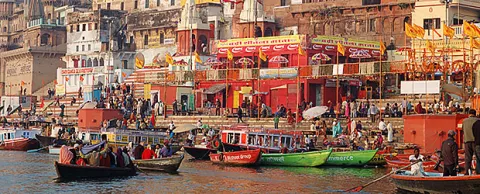
India’s efforts to create 100 new smart cities are still in the early stages, though one major milestone is approaching fast. Prime Minister Narendra Modi, who made the pledge, says the government will unveil its smart cities policy on March 31.
One of the first details to emerge so far is that the 100 cities will be picked through a competition. One of the deciding factors will be how much the cities have done to support his initiatives, including Make In India, which is designed to turn India into a major manufacturing hub, and Swacch Bharat, which encourages cities to clean up. Other factors could include the quality of their infrastructure, the level of city services that are citizen-focused, and overall quality of life.
While some smart cities are being developed now, other details on the initiative have been scarce so far. It’s anticipated that some of the 100 smart cities will be existing cities that get infrastructure upgrades, while others will be built from scratch.
The smart cities project is meant to create sustainable, livable cities in a country where the population is swelling rapidly. India’s population is forecast to reach 843 million by 2050 – more than double what it is today.
India’s next emerging smart citiesEven in advance of the release of the official smart cities policy, some work is underway, especially in the already highly-developed corridor between Dehli and Mumbai. But to fulfill the smart cities vision, the effort is going to have to progress to smaller cities. Those opportunities are captured in a new report -- India's Top 20 Promising Cities -- by FIRST Sm@rt Cities Council.
The report finds that several of the cities on the promising list could eventually graduate to become major metropolitan areas. It examines why each city is poised to emerge and discusses what the cities need to do to take advantage of the opportunity. Officials of all 20 cities on list participated in the Sm@rt Cities Summit this week in Delhi.
Cisco selects its first smart city
Council Associate Partner Cisco has already selected its first smart city. The company says Visakhapatnam is the first that it will work to transform.
Visakhapatnam, which did make the list of promising cities, is a port city of 1.7 million. In addition to trade, the city's top industries are agriculture and fishing, and related businesses.
Cisco plans to make the city much more high-tech. It plans to set up a skill development center and a business incubator. It will also improve education and healthcare through technology.
Another area of focus for Cisco is to help the city improve its ability to recover from disasters. The city is typically hit by two cyclones each year.
An article on Livemint.com points to several European firms that are reinforcing their operations in India, including Council Lead Partners Alstom Grid, Schneider Electric and ABB and Siemens, both Associate Partners. It quotes Laurent Schmitt, VP of automation and smart grids for Alstom, on the significant opportunites for smart grids and smart cities in India.
“Alstom already has a critical size and presence in India along with significant R&D investments. We have fully transferred our intellectual property to India and grown our team here. We want to capitalize our talent in India,” Schmitt said.
Charbel Aoun, president for smart cities at Schneider, noted in the article that the company has solutions for energy, traffic, water and building operations, all of which can create significant savings for cities in India and their citizens.
A major banking investment
Asian Development Bank also says it’s committed to supporting India’s vision. It calls 2015 a milestone year for international development and says it’s firmly behind the country’s smart cities efforts.
One of its priorities protecting resources and energy efficiency. It is calling on Indian city leaders to emphasize low carbon development and make smarter use of land and water. Transportation and improving services for the poor are also areas of focus.
Asian Development Bank says new technology will help, but cities also need to do more integrated planning, make more timely investments in their infrastructure and make much better use of their land.



